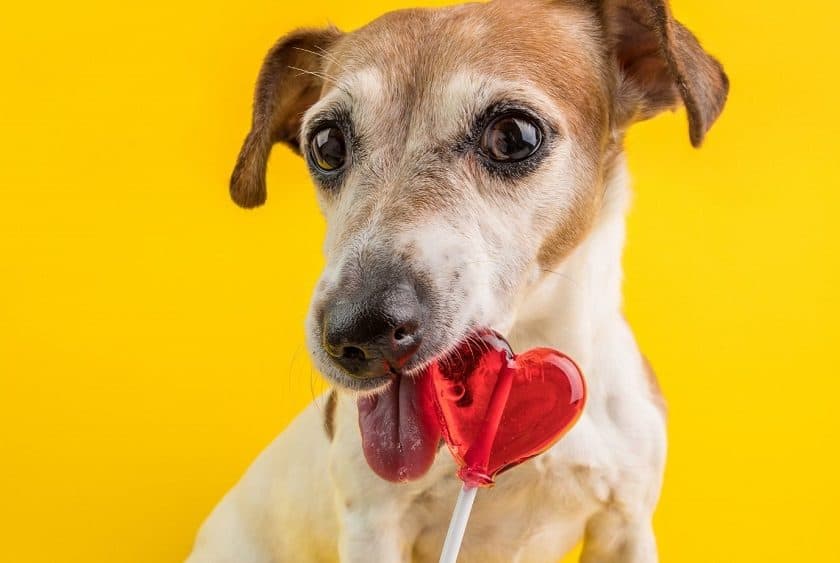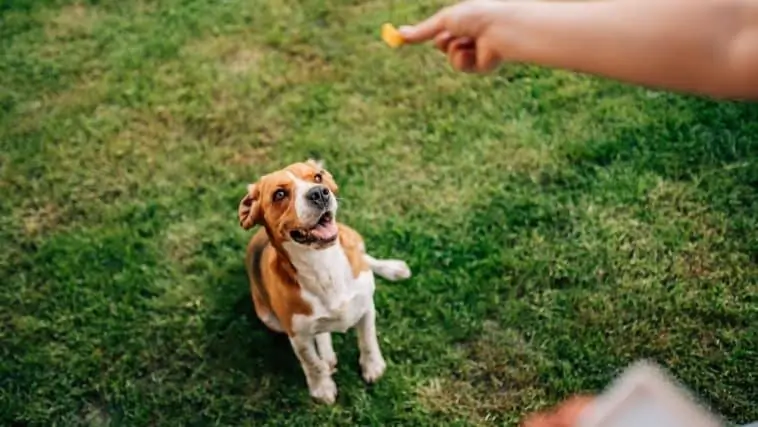In the tiniest of accidental amounts, it’s not the end of the world if your dog eats a Jolly Rancher or whatever it is you happen to be enjoying.
However, regularly ingesting anything outside of their healthy, nutritional diet is cause for concern, particularly when you look at the ingredients listed on the back of certain snacks.
For instance, xylitol is an artificial sweetener used in tons of your favorite sweets, from delicious baked goods to chewing gum, toothpaste and, you guessed it… candy.
Anything that contains this substance is incredibly harmful for your dog, so it should be avoided at all costs. Side effects include vomiting, lethargy and dizziness, with a drop in blood sugar and the potential for seizures or liver failure, which can be fatal.
Candy like Starburst, Skittles, Candy Corn and anything sour are relatively safe if only a little bit is consumed, so should your pup grab a bite there’s no immediate cause for concern.
Sugar isn’t toxic for canines, so it’s only if they eat a considerable amount or ingest these sorts of sweets regularly that you’ll begin to notice any side effects. Too much and they’ll end up needing to vomit, have diarrhea or both.
However, modern sweeteners and granulated sugars can certainly cause stomach problems for your pooch, as well as lead to an imbalance of their gut bacteria, which results in trapped wind, discomfort and potentially even hospitalization depending on how much they consume.
Other human favorites that are an absolute no-no for your dogs include caffeine, chocolate and raisins, all of which also happen to be found in many different kinds of candy, from Reeses Pieces to fancy boutique truffles.
Milk chocolate is harmful when more than a few grams is consumed, but dark chocolate in particular can be toxic to dogs in any amount, especially the small ones, as their bodies are less able to metabolize anything poisonous.
If your dog has eaten chocolate, they may well experience seizures, muscle tremors and even heart rate abnormalities called arrhythmias. In the most severe cases, it has been known to cause death, so this really isn’t something to mess around with.
Be aware that it can often take several hours, sometimes days for pets to indicate that anything is wrong with chocolate toxicity – which is also referred to as theobromine poisoning, given that this is the chemical it contains which is poisonous to pooches.
It’s possible that by the time you realize something is the matter, nothing can be done to save them.
Should your dog eat raisins, dark chocolate or macadamia nuts, then you want to immediately contact your veterinarian, or if you feel it’s more pressing, animal poison control.
It is important that you always keep sweets away from your furry friends: they have powerful, sensitive noses that can detect snacks impressively.
Just because it’s poisonous to them, doesn’t mean it won’t smell delicious, so be sure to put everything potentially dangerous out of reach.
When your pup has a habit of getting into the trash, it exposes them to things they shouldn’t eat. Securing the bins and bags in your kitchen means they won’t be able to get in and steal leftovers that might make them unwell.
Dog-appropriate sweet treats

Not keen on using store bought treats for your dog? Okay, you’re welcome to whip up your own at home, with some fairly affordable and natural ingredients.
Sweet potato: provided that you’ve thoroughly cooked it and removed the skin, which dogs find difficult to digest, your canine companion will love the slightly-sweet taste of this bright orange vegetable.
They’re packed full of useful vitamins, including A and C, which are beneficial for pups and form part of a healthy, balanced diet.
Peanut butter: It’s been known for decades that dogs can’t resist this sweet yet savory treat, and in moderation it’s more than safe for them – as long as it does not contain any xylitol, so always check the label before you offer your pooch the spoon!
There’s many different kinds of treats you can make with just some PB and a handful of other pup-friendly ingredients, so have a google!
Homemade popsicles: Using water and some pooch-appropriate fruit, you can make a sweet and frozen treat for dogs that is ideal for hot days in summer.
Fresh fruit that is safe for dogs include:
Yogurt: As long as it is plain and contains no added sugar, yogurt is a great dessert option for dogs – especially when topped with some of the fruit above. Plus, you can also freeze your fruity, yogurt combinations to give your dogs their very own ice cream to enjoy in summer.
Baby carrots: Though we humans don’t necessarily consider this pint sized veggie to be sweet, the natural sugars they contain are more noticeable by dogs, making them a great crunchy snack for your pup. Green beans are also good, especially as they can also be given raw.
Dogs And Candy – General Advice
Remember, dogs have different palates to humans, and the meaty treats that are whipped up by manufacturers are always going to be enticing – and a lot safer than any human food you could offer them.
Candy has zero nutritional value for your pooch, and though you might worry they’re missing out on the things you enjoy, they’ll never miss what they don’t have, but they will get sick if you accidentally give them too much.
The best way to treat them is to give them appropriate food! You don’t want to accidentally make your loyal companion sick or even worse just because you were trying to give them something sweet to enjoy.
Just because in small doses nothing bad will happen with certain candy, doesn’t give you a free pass to pop a packet open and start sharing! Stick to the things outlined above and ensure your pooch has a balanced, healthy diet.

